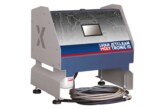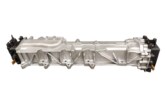
Can engine oil actually freeze during winter? This case study from the Verification of Lubricant Specialists (VLS) demonstrates why the cold weather properties of lubricants are so important during winter.
Lower temperatures during winter can have a physical impact on engine oil, with colder temperatures causing the oil to become thicker. This can lead to starting problems if the lubricant can’t circulate through the engine as easily and effectively as it should, leading to accelerated wear. The last thing any haulier wants on a cold winter morning is an engine refusing to burst into life, ruining the journey ahead.
Today’s advanced lubricants should be capable of providing sufficient lubrication for engines whatever the weather. Thanks to specific chemical formulations, the same oil should be suitable for use all year round.
However, VLS, the independent industry trade body set up to investigate and verify lubricant specifications, discovered an engine gear oil that wasn’t able to cope during extreme temperatures.
In independent laboratory testing, the lubricant was found to turn solid at-40⁰C. Whilst the temperature in some parts of the country rarely stays below freezing for a sustained length of time, extreme temperatures are not uncommon in Scotland.
For long distance hauliers travelling across the European continent, this could pose a severe risk, especially in the Baltic States or Scandinavia. To be within specification, lubricants must be able to perform – even in these extreme conditions – to avoid accelerated wear to gears and bearings during low temperature operation and start-up conditions.
VLS worked with the supplier concerned to initiate a product recall, remove the old stock from sale, and reformulate the product to meet the specification. Trading Standards were involved to ensure the required action was taken and that products were fit for purpose, whatever the weather.
Andrew Goddard, Chairman of VLS, comments: “This was one of the first cases VLS investigated and it was a highly significant one. As a result of the process, the supplier involved was much more aware of the aims and objectives of VLS and how important adhering to specifications was.
“Lubricant blenders may be tempted to reduce the amount of additive treat in a blend as they don’t expect to reach ambient winter temperatures that low. However, products still need to meet their specification in order for the trade and the public to have continued confidence that the products they are buying are fit for purpose and will help protect against damage to vehicles.”
VLS continues to investigate complaints about engine oils and other lubricants, including referring cases to Trading Standards if required to ensure the appropriate action is taken by lubricants manufacturers and distributors.
VLS also works to educate workshops, technicians, motorists, and the wider automotive industry to improve understanding about oil choice. Increasing general knowledge about vehicle lubricants is key to ensuring standards remain high and that lubricants being sold really can deliver what they claim.
If you have any concerns about an engine oil or lubricant product, you can report them to VLS by calling 01442 875922 or emailing admin@ukla-vls.org.uk. VLS handles all cases anonymously through a clearly defined process which includes technical review by a panel of experts from across the industry and dialogue with the manufacturer and all relevant parties to work together to resolve any issues. Since 2014, VLS has independently verified over 65 lubricant specifications, to ensure products really can deliver what they claim.








